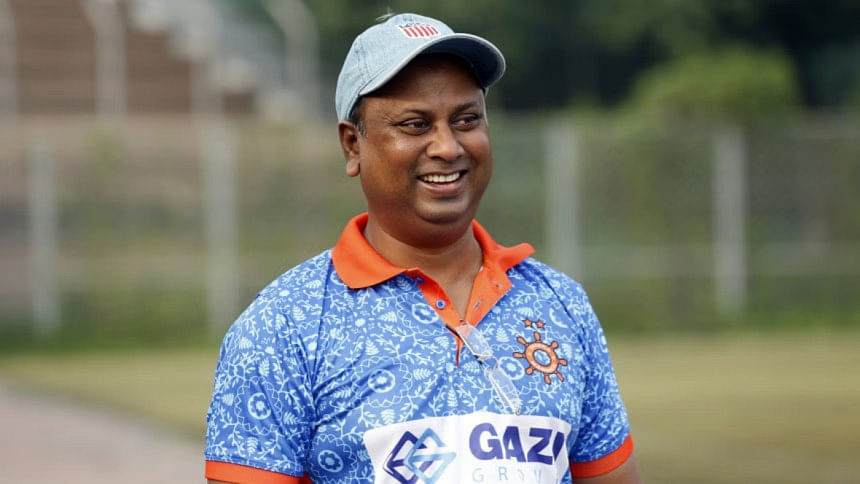‘Players have basic skills but lack tactical awareness’

Bangladesh failed to qualify for the Asia Cup for the first time in 43 years after finishing third in the AHF Cup -- a tournament which they had won the last four times. The team has come under heavy criticism from various quarters for their lacklustre display, against sides they used to breeze past in previous times. Head coach Mamun Ur Rashid spoke to The Daily Star's Anisur Rahman from Indonesia about the reasons behind the failure -- including flawed planning, poor tactical awareness, and the rapid development of other nations.
The Daily Star (DS): How do you evaluate Bangladesh's performance, finishing third instead of defending the AHF Cup title and thus failing to qualify for the Asia Cup?
Mamun Ur Rashid (MR): Obviously, it was a disappointing result. But it's unfair that some people on social media targeted a single individual -- me. Many focused on one player, Jimmy [Rasel Mahmud], who wasn't selected due to his age. Can anyone guarantee we would have won if Jimmy played? Instead of blaming individuals, journalists should investigate deeper: why didn't the team click? What issues existed? Bangladesh barely played any international matches since the 2023 Asian Games -- almost two years without competitive action.
DS: Bangladesh had previously played the AHF Cup with minimal preparation and amid irregular domestic competition. Where exactly did we fall short this time?
MR: When was our last domestic league properly held? The result is disastrous, and it will only get worse if things don't change. Our so-called development plans are not real plans. Look at Chinese Taipei: they struggled four years ago but responded by building a program, playing regularly in Korea, Japan, and China to prepare for the AHF Cup. Their progress is no accident.
DS: Bangladesh struggled against every opponent. Was it a decline in our quality or an improvement from others?
MR: We have remained stagnant while others have moved forward. If we take two steps, others are taking a hundred. Nobody likes poor results, but we once played World Cup qualifiers -- now we're far from that level. No one even talks about it. Our players only trained for 40 days after 22 months without competitive matches or practice games. Facilities are poor — players still receive Tk 400 daily allowance, the same as a decade ago.
DS: Bangladesh's defence was vulnerable, and the team lacked build-up play despite your success at age-group and domestic levels. What happened?
MR: The conditions were tough -- temperatures around 33°C with high humidity. We also made a mistake: bringing only one set of jerseys. Players were drenched with sweat even before matches began and couldn't change at halftime. Fatigue hit them after 15–20 minutes. Additionally, I had only two drag-flickers, (Sohanur Rahman) Sabuj and Ashraful (Alam), meaning I couldn't rotate defenders properly, and they got exhausted.
DS: Do you believe this group of players lacks the quality of previous generations?
MR: Our system heavily depends on BKSP graduates. They have basic skills but lack tactical awareness -- they don't know when or where to use their skills during a match. For example, against Oman, we were leading 2-1, but a simple defensive mistake -- failing to let a ball go out -- led to a penalty corner and a goal against us. Many players don't even understand concepts like full press or half press.
DS: Bangladesh U-21 team have qualified for the Junior World Cup, while the senior team failed to qualify for the Asia Cup. What message does this send?
MR: It's not a good message. The federation must take it seriously. What we are doing now for development isn't enough. People keep looking back at the past instead of addressing what needs to be done now.
DS: Who should be held responsible for this failure?
MR: Everyone -- players, coaches, and the federation. Players are responsible for their performances on the field, and we, the staff and officials, are responsible for failing organisationally. It's a collective failure. I'm not upset because failure is part of the process. I've been coaching for 15–20 years, often fighting against the current. Sometimes people label me as being from this club or that club, but no one says Mamun is a man of hockey. I accept this failure, but I'll keep working harder for future success.
DS: What must be done to recover from this situation?
MR: We need long-term planning -- not just one-month preparations. The federation should design one- to two-year plans. Failure isn't the end. It should be used constructively to build a stronger future.

 For all latest news, follow The Daily Star's Google News channel.
For all latest news, follow The Daily Star's Google News channel. 



Comments